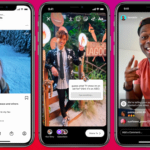If the US antitrust authorities have their way, Facebook parent company Meta will have to sell its two subsidiary networks Instagram and WhatsApp again. After an initial lawsuit was rejected in the summer of 2021, the federal court in Washington has now approved a revised version.
The US government wants to break up Facebook parent company Meta. The responsible antitrust authority, the Federal Trade Commission (FTC), accuses the group of a monopoly position in the market for social networks.
By buying the Instagram and WhatsApp platforms, Meta, formerly Facebook, also wanted to protect this monopoly position in an unfair manner, according to the accusation.
But after an initial competition lawsuit was dismissed in summer 2021, the US authorities have now achieved a partial success. The responsible federal court in Washington has approved a revised version.
Does Meta have a monopoly position in the market for online networks?
Back in December 2020, the FTC had filed a competition lawsuit against Facebook for violating antitrust law. However, the competent federal court in Washington rejected the complaint in the summer of 2021. The U.S. antitrust authority had not been able to prove that Facebook had a monopoly in the market for social networks, according to Judge James Boasberg.
However, he left open the possibility for the FTC to file an updated complaint within 30 days. The authority made use of this option.
Since then, the antitrust watchdogs have been hoping for a ruling that would force Facebook to sell the Messenger service WhatsApp and the social network Instagram again. Parent company Meta should also be required to obtain prior approval for potential acquisitions in the future, they said.
Facebook called the lawsuit unfounded at the time. The FTC was still unable to prove that Facebook held a monopoly position, as this did not exist, according to an official statement. But the federal court in Washington now saw things differently.
U.S. federal court allows antitrust suit against Facebook
The competition lawsuit, with which the U.S. antitrust agency wants to break up Facebook, was accepted in the second attempt by the responsible judge James Boasberg. Court documents show that Boasberg now considers the accusation of unfair competition to be much better founded.
He also rejected a claim by Facebook that FTC chief Lina Khan was biased. As required by the federal court, the antitrust authority apparently provided sufficient arguments in the improved version to prove Facebook’s monopoly position.
Facebook parent company Meta, meanwhile, expressed confidence in a statement. The group is confident that it will be able to uncover significant weaknesses in the FTC’s explanations.
The antitrust watchdogs are still calling for a sale of the Instagram and WhatsApp platforms. However, it could be some time before a final ruling is reached. The proceedings could take several years.










